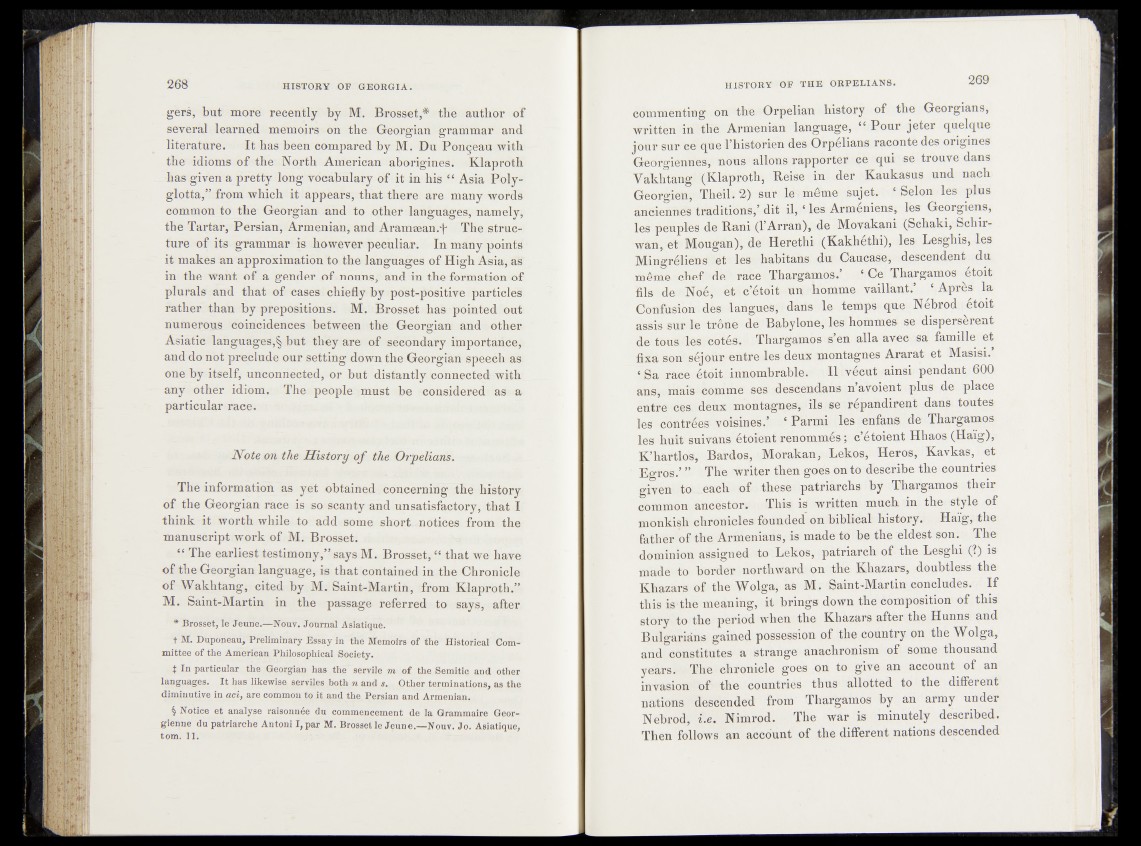
gers, but more recently by M. Brosset,* the author of
several learned memoirs on the Georgian grammar and
literature. It has been compared by M. Du Ponceau with
the idioms of the ,North American aborigines. Klaproth
has given a pretty long vocabulary of it in h is “ Asia Poly-
glotta,” from which it appears, that there are many words
common to the Georgian and to other languages, namely,
the Tartar, Persian, Armenian, and Aramaean.-f* The structure
of its grammar is however peculiar. In many points
it mates an approximation to the languages of High Asia, äs
in the want of äugender of nouns, and in the formation of
plurals and that of cases chiefly by post-positive particles
rather than by prepositions. M. Brosset has pointed out
numerous coincidences between the Georgian; and other
Asiatic languages,§ ;but they are of secondary importances
and do not preclude our setting down the Georgian speech as
one by itself, unconnected, or but distantly connected with
any other idiom. The people must be considered as a
particular race.
Note on the History of the Orpelians.
The information as yet obtained concerning "the history
of the Georgian race is so scanty and unsatisfactory, that I
think it worth while to add some short notices from the-
manuscript work of M. Brosset.
ft The earliest testimony,” says M. Brosset, “ that we have
of the Georgian language, is that contained in the Chronicle
of Wakhtang, cited by M. Saint-Martin, from Klaproth.”
M. Saint-Martin in the passage referred to says, after
* Brossét, le Jeune.—Nouv. Journal Asiatique.
t M. D uponeau, Preliminary Essay in the Memoirs of the Historical Committee
of the American Philosophical Society.
t lu particular the Georgian has the servile m of the Semitic and other
languages. It has likewise serviles both n and ». Other terminations, as the
diminutive in aei, are common to it and the Persian and Armenian.
§ Notice et analyse raisonnée du commencement de la Grammaire Géorgienne
du patriarche Antoni I,par M. Brossetle Jeune.—Nouv. Jo. Asiatique,
torn. i l .
commenting on the Orpelian history of the Georgians,
written in "the Armenian language, “ Pour jeter quelque
jour sur eë que l’historien des Orpélians raconte des origines
Géorgiennes, nous allons rapporter ce qui se trouve dans
Vakhtang (Klaproth, Reiserfti der Kaukasus und nach
Géorgien, TheiLv2 )n3u*r l^même^sujet. ‘ Selon les plus
a n c ie n » traditions,’ dit .Arméniens* le* Géorgiens,
les peuples de Rani (f Arran), de Movakani (Schaki,.Schir-
wan, et Mougan), de Herethi,(Kakhetb?i), les Lesghis, les
Mingréliens et ' les * habitans du Caucase, : descendent du
même ché£ de race Thargâmos.’ Thargamos étoit
Mis de Née/ ê t, cétoit un homme vaillant? ‘ Après la
Confusion - dès? langues/ 4 dans le «temps que^Nébrod ©toit
assis sur le trône tèê! Baby lone‘4!ed hommes, se dispersèrent
de tous-les/cotés, Thargamos s’en alla»avec;sa famille et
fixa son- séjour entre le#Ieux montagnes Ararat et Masisi/
‘ Sa race étoit èp|nombrable. Ilfcéeut ainsi pendant 600
ans, mais comme ses descendans n’avoienii plus de place
entre cea deux montagnes, ils se répandirent dans toutes
Itesmontrées voisines/ ‘ Parmi les enfans de Thargamos
les huit suivans étoient renommés c’étoient Hhaos (Haïg),
K’hartlos, Bardos, Morakan, 'Lekos, Héros, Kavkas, et
' Egros/ ” The writer then goes on to desdhibethe countries
given/to each of these patriarchs by Thargamos their
common ancestor. This is written mueh dm, the' style of
monkish chronicles founded on biblical history. Haig, the
father of the Armenians, is made to beéihe eldest son. The
dominion assigned ^to Lekos, patriarch of the Lesghi,$| is
made to border northward on the Khazars, doubtless the
Khazars of the Wolga, as M.' Saint-Martin concludes/ 1 If
this is'the meaning, it brings down the composition of this
story to the period when the Khazars after the Hunns and
Bulgarians gained possession of the country on the Wolga,
and constitutes a strange anachronism of some thousand
years. The chronicle goes on to give an account of an
invasion of" the countries thus allotted to the different
nations descended from Thargamos by an army under
Nebrod, i.e. Nimrod. The war is minutely described.
Then follows an account of the different nations descended